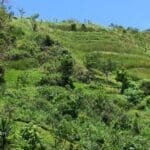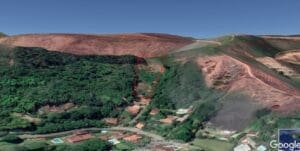
The most recent (February 2022) devasting landslides in and around the City of Petropolis (located in Brazil’s state of Rio de Janeiro), are not new to the region, but the frequency and severity appears to be increasing due to a combination of extreme, climate change, induced rainfall events and poor land use; the latter includes unregulated housing on steep slopes, poor drainage, and deforestation. Not all landslides can be prevented, but many can, and most landslide sites can be rehabilitated so slippage does not occur again. Vetiver Grass Technology is proven to be effective for landslide mitigation.
Fifteen kilometers to the north-east of Petropolis is the town of Itaipava, located in similar mountainous terrain, and also subject to extreme rainfall events. On February 2nd, 2008 the area received 130 mm of rainfall, resulting in flooding and landslides. One of the slides was located at S 22.402991°, W 43.122255°, destroying a hillside and damaging the owner’s, Joao Henrique Eboli, house. The landslide occurred on a deforested area of grasses and shrubs, and covered 1840 sq meters (74m x 43m). The upper section had a 1:1 slope gradient.

Soon after the event Mr. Eboli learned about vetiver grass, and, with some engineering advice, he rehabilitated and stabilized the area. Details of this work are summarized in this document and photo presentation.
About 10,000 vetiver slips were used at total cost, including labor and equipment, of US$30,000 (US$16/M2). In 2011 the same site was subjected to 113 mm rain in 24 hours (including an intensive 95 mm in 2.5 hours). There was no damage or further slippage. From the latest 2022 satellite imagery it appears that after 14 years, from the time that vetiver was planted in 2008, the site has remains secure.
Some rather similar successful land slide stabilization work has been undertaken in Madagascar. See this document by Yoann Coppin. Elsewhere in China, Thailand, Vietnam, Nepal, Philippines, and Bangladesh vetiver is becoming better known for its landslide mitigation ability.
So why hasn’t the Vetiver System been used more to mitigate some of these problems in Brazil, both for landslide rehabilitation and prevention? Perhaps Lucio Lambert of Brazil may have part of the answer in his recent Facebook posting when he commented on the current Petropolis tragedy:
” Governors (state) in general opt for temporary, short-term and expensive actions involving large activities that quickly use up available funds. The root causes of the problems continue, and we pay with human lives. Petrópolis has 18% of its territory in HIGH risk areas with some 20,000 homes. Elections come, years go by, and tragedies repeat themselves. Who remembers 2011? – 918 dead, 1988? – 134 dead, 1966? – 250 dead. At the time of the 2011 catastrophe, I started studying and working with the Vetiver System. A simple, inexpensive, definite, sustainable solution that involves communities. The Vetiver System makes risky ecosystem more resilient and secure, by binding the soil with its deep roots system (significantly increasing shear strength of soil in the first 2 meters). Would anyone be interested right now? Which Brazilian city will become a model for this type of technology?”
Rommel Sauerbronn from Cunha writes: “VETIVERY System! TRAGEDY in PETROPOLIS! The tragedy repeats itself in Petropolis, unfortunately. In 2011 a terrible tragedy happened in Petrópolis, Teresopolis and New Friburg RJ, more than 900 people died. As soon as we knew about this tragedy, award-winning architect Sérgio Prado, another engineer colleague and I loaded a truck with vetiver slips and from São Paulo we drove to Petrópolis RJ to offer our help and expertise for preventing landslides and erosion through the planting of the deep-rooted Vetiver grass. In a meeting at the Town Hall with Municipal Secretaries we proposed, we offered to DONATE our expertise and VETIVER material to be planted and multiplied, and afterwards, planted at all points of greater risk of slips throughout the municipality. Unfortunately our offer was not accepted, the authorities didn’t care at the time, they didn’t see how to earn R$ from our donations. We left very, very sad, literally blown away by the denial of what we had best to offer, thinking about preventing future tragedies. Time has passed and today a new tragedy has happened, it could have been avoided or minimized if they had adopted this bio-engineering technology. New tragedies can be avoided if the authorities the MAYOR wake up to the VETIVER SYSTEM! “From <https://www.facebook.com/groups/vetivernetwork>
I know how Lucio and Rommel feel, and their frustration with local authorities for not using biological systems that work and are proven. Sadly, it’s a worldwide problem that has to be addressed. It is also a reflection of the time it takes for people to respond to new technologies, particularly those that do not always show instant results. We need to find ways of rectifying these deficiencies.